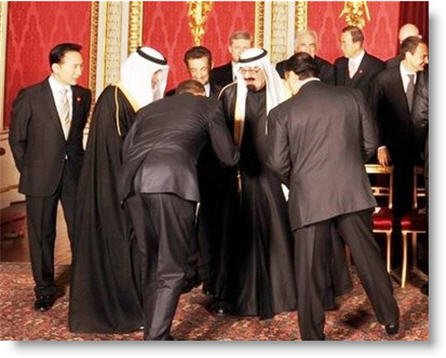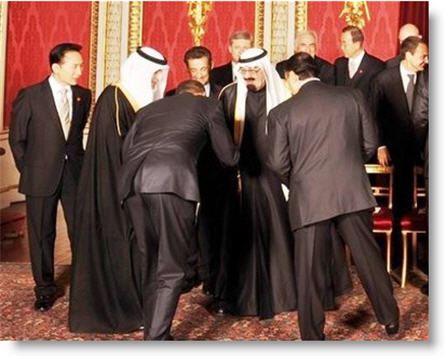Huff post editors must have had a day off:

At the G20 summit in Antalya, Turkey, President Obama responded to the latest terrorist attacks in Paris and made a slightly surprising allusion.
In a response to a question about the relationship between Islam and terrorism, he said “… I also think the Muslim community has to think about how we make sure that children are not being infected with this twisted notion that somehow they can kill innocent people and that that is justified by religion. To some degree, that is something that has to come from within the Muslim community itself, and I think there have been times where there has not been enough pushback against extremism.”
The President, who almost put forth a motion for reform in Islam, couldn’t help but later sanitize an otherwise promising declaration, padding his statements with obfuscation and taking great pains to disqualify a connection between the teachings of a religion and the actions of terrorists.
I understand his unwillingness to be inflammatory, and I get that there are reasons he tries to remove terrorist ideology from the Everyman. And I understand his reluctance to offend millions of Muslims. But this effort to avoid causing offense seems to be obscuring an otherwise useful conversation about the relationship between religion and extremism. The President’s doublespeak is symptomatic of an unsettling problem.
Legitimate criticism of Islamists has been acute but sparse, and the pushback against debate has come in many flavors — almost all widely missing the point. In Europe and the United States, the left are a great deal of the problem. One of the characteristics of the liberal left is a political preoccupation with defending those who are disenfranchised; those that are viewed as victims. Often, I count myself as one of these liberals.
In the last 50 years, the liberal left has accomplished much by flouting a negligent Establishment, strengthening civil liberties that would have otherwise been lost in stagnant conservatism. But any chronic preoccupation eventually leads to myopia, and in the case of Islamism, the left seems to have lost its way. Perhaps this is a result of some deep-seated fear of offending, but I submit that dishonesty is at the heart.
This conflict between pragmatism and the liberal tradition is typified in Sam Harris and the reaction he has received from the left. Among other things, he is a rare counter-voice to simple liberal Islam apologists, bringing to light the connection between Islamic doctrine and violent behavior.
Harris’ analysis has been met with knee-jerk cries of racism, bigotry and the weak label “Islamophobia.” I hold the left mostly responsible for the term Islamophobia, which cleverly equates racism and xenophobia with criticism of the ideas of a specific religion — an unfair lumping together. It is a favorite tool used to silence those who link a religious ideology with negative concepts. When an interpretation of any religious teaching equates to blatant human rights abuses or harm to society, it is simply irresponsible to let it slide. Many liberals on the left seem to confuse criticism of other cultures (religion, in this case) with an endorsement of racism.
Nick Cohen makes the important clarification that “a trap springs when you fail to realize that tolerating is not the same as respecting or endorsing. A tolerant society does not abandon the freedom to argue.” Tolerating the ideas of Sam Harris does not somehow mean that one is a xenophobe. Far from it. Cohen distinguishes two groups of liberals: one group decries human rights abuses that result from religion in any culture (objectification of women, criminalizing gays, punishment for diverse beliefs…etc.), while the other is selective in its human rights pet projects. This latter group of liberals is a serious problem.
In the moral response to theocracies like Saudi Arabia, the hypocrisy seems to be laid bare, as that loathsome regime has institutionalized religion, using the same scripture and philosophy as terrorist groups like ISIS, the Taliban and Al-Shabaab to justify appalling atrocities. Sam Harris criticizes Islam’s bad ideas by way of example and thought experiment and analogy, trying to debate, and instead of being judged by his analysis, he is labeled with lazy terms like “dangerous” and “bigot” by leftist apologists who work very hard to find racism and bigotry where none exists.
Comedian Dean Obeidallah and commentator Glen Greenwald are shining examples of the limitations of the liberal tradition, both resorting to easy personal attacks on Harris, ignoring any link between doctrine and violence (Greenwald just being more verbose and dishonest about it). Reza Aslan also attempts to cast Harris as dangerous and unqualified to criticize religion because he thinks Harris isn’t an expert on religion. He dresses his affectations in the standard obfuscations of an academic, the kind of thing the left eats up. Yet his gab is nothing more than a convoluted blanket apology for religions veiled in more sloppy ad hominem attacks of character on Sam Harris and those who think like him (Aslan calls these people his disciples).
These dodges and excuses are becoming numerous, but they generally take form in at least one of the following standard talking points of the left, talking points that usually place blame on ourselves: vague notions of inequality, imperialism, the CIA, American foreign policy, poverty, the Iraq War, failure of integration into European society…etc. These are all real issues that deserve attention, but in the case against radicalization and Islamism, they seem to be camouflage on the elephant in the room.
Unfortunately, many of the voices that are approaching any venture into the moral landscape of this problem are the loudest voices of demagoguery in the West — those on the far right (one of several key notions that Greenwald has trouble grasping). It is unfortunate and frightening because these are the people that have at best a tenuous grasp on the issue at hand, and they are often the most religious themselves, as well as uninformed, genuinely racist, bigoted, xenophobic or overtly nationalist.
In France, Marine Le Pen has been at her most puffed-up lately, riding a wave of fashionable blanket fear of immigrants, of bearded men in skull caps and of any French citizen who disagrees with the limited National Front party platform. The drivel from Republican politicians in the U.S. has been spectacular these days: rejecting desperate Syrian refugees, imagined no-go zones in Paris and London where the police are afraid to enter for fear of Sharia, screening immigrants for acceptable religious affiliations, Ben Carson’s half-witted “monitoring” of every single visitor that travels to the United States. But however easy it is to dispense with the appalling ideas of the right, it is all the more disconcerting that they are the ones even approaching a real debate. The left’s problem is a bit more complex.
In a free society, often uncomfortable things must be said to opposing parties to effectively work out complex issues. But when someone attempts to criticize the beliefs of a religion (mostly Islam), the left will invariably attach that criticism to racism. But racism cannot also be used for those who question the ideas of a religion, or their dogmas, or attempt to demonstrate the relationship of religious ideas to terrorism. This only cuts off the kind of debate that has usually taken place in the conversations of the liberal left.
There will always be people who agree or disagree with whether or not a particular interpretation of a text (holy or otherwise) is correct. And that is the point. The goal of an enlightened people is to be able to discuss those interpretations for the benefit of society, to discuss what is harmful and what is not. There are many people in the United States, for example, who fervently believe that all the animal life we see today once packed into a wooden boat to escape a global flood from an angry God. We have come to the conclusion that no one should be prevented from believing this, but those believers must live with their ideas being scrutinized (and for the most part, they do), and more importantly, they must accept that these ideas will not be institutionalized. It would not be helpful for the left to denounce the criticism of literal readings of the Bible as racist or contriving a term like Christophobic.
So, what is there to do?
Firstly: have ideas, discuss, criticize. I reserve the right to criticize any belief system that seems to me to violate rational thought, human rights or free speech. Much less, I expect my criticisms not to be criminalized. I may be wrong, I may be partly right, but I expect to be able to discuss without fear of reprisal, either from the left or from Islamic religious fundamentalists.
In the Information Age, it has become easier than ever to witness the behavior of far-off cultures first hand, testing the limits of cultural relativism. The debate on what is moral (and what is not) cannot be cut off for whatever reason, the least of all because of selective liberal political correctness.
Secondly, Muslims must be allowed to have ideas, discuss and criticize their own belief systems without fear. Yes, this is easy for me to say, a non-Muslim living in Western Europe. But anyone can recognize the courage of people like Maajid Nawaz, Ayaan Hirsi Ali, Malala Yousafzai and Saudi blogger Raif Badawi (amongst many others) who have dealt with the consequences of questioning their Muslim religious establishments, to the detriment of their own safety, well-being and worse.
But this is exactly the ambiguous middle ground that is required for debate and change. Muslim theocrats do not like this middle ground. In Iran, the supreme leader Ayatollah Khamenei says it best: “The present US officials are against the principles of Islam and unlike their statements they are after fomenting differences among Muslims and its example is creating terrorist groups like Daesh….” It seems to me that these differences between Muslims is what is needed, not through incitement or force with ulterior motives, but as natural processes; differences created by free conversation, what Maajid Nawaz calls the “grey zone,” a healthy disruption of fundamentalism. He stresses that by forcing everyone to pick sides, what ISIS clearly wants, non-Muslims and Muslims will only drift to opposite poles. What about all the Muslims in the middle who question some parts of their religion but not all? So that they are not judged by the actions of extremists, should they not also be allowed to question and speak freely and think critically without fear of those in their own community? In that grey zone I would place the ability to accept (and provide) criticism without calls of blasphemy or racism (again, from fundamentalists or liberals).
It is not necessary to be an expert on the complexities of Muslim movements to notice that Muslim tolerance of believers in other strains of Islam is by moderate estimates low, and tolerance of non-believers even lower. And it should not be unacceptably offensive to Muslim apologists like Dean Obeidallah and Reza Aslan to mention that this intolerance is noticeable, nor should it be unacceptable to suggest that the teachings of religious ideas have much to do with the actions of the some Muslims, to whatever extent they are a minority, who are activists and jihadists. As Nawaz stresses, Islam doesn’t have everything to do with their actions, but it has something to do with it.
It is time that the left remember its principles, and stop castrating debate and free discourse. Perhaps it needs to look to real liberals in Muslim societies abroad, like Malala Yousafzai and the countless others who speak out against their theocracies, fearing for their lives daily. It is time for the left to put as much intellectual muscle into criticizing harmful religious ideas as it does into protecting the sensibilities of the everyday Muslim living in London.

